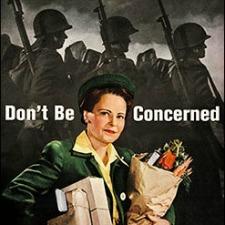BOB GARFIELD: So was US government domestic propaganda ever really that much of a threat? Absolutely, says historian Thomas Fleming, author of The Illusion Of Victory: America in World War One. The First World War was the occasion for the government's most ruthless battle for American hearts and minds.
THOMAS FLEMING: World War I is the war in which we can see where the federal government decided they had to control, as much as possible, all the information that was going out to the public. And so, in concert with an ex-newspaperman named George Creel, C-R-E-E-L, a very fascinating volcanic type character, President Wilson created the Committee on Public Information, which soon became a gigantic federal monster. They had 150,000 people working for them by the time the war ended, which was – didn’t last that long. You know, it was only a year and a half. And yet, it became a huge operation.
BOB GARFIELD: It was very much the ministry of propaganda.
THOMAS FLEMING: There’s no doubt about it. These people were into everything. They actually published an official federal newspaper, 32 pages, tabloid size, every day. It was a daily paper. It went out to every newspaper in America.
BOB GARFIELD: Brooke, in her book, The Influencing Machine, talks about the Committee for Public Information and said that its role was to spread war fever by suppressing bad news and equating dissent with disloyalty.
THOMAS FLEMING: Everybody who wasn’t enthusiastic about the war was liable to get in a lot of trouble under something called the Espionage Act, which Wilson had put through Congress. Anybody who said anything against the government or against Wilson, in particular, could be sentenced to jail. One farmer in the Dakotas – I’m not sure which, North or South - told a young man, “Don’t join the Army, this war is a lot of foolishness.” He got five years in jail.
If you were riding on a streetcar and you happened to say to the man next to you, “I think President Wilson is an idiot,” if he reported you to the Committee on Public Information or to the American Protective League, which was their enforcement arm, you could do a lot of time in jail.
BOB GARFIELD: And how did the government egg people on to denounce their neighbors and family members and friends? What did the propaganda look like?
THOMAS FLEMING: They had a huge team of people who traveled around the country. They were called the Four Minutemen. And very often you’d go to a movie and the screen would go dark and one of the Four Minutemen would walk out and he’d give this rousing speech how we have to fight, we have to believe in America, we have to make the world safe for democracy, all the clichés that Wilson had put into his speech declaring war. This was all drummed into the minds of people at every level, all the way across the nation.
BOB GARFIELD: During World War I, the propaganda machine was a vast juggernaut. What happened in World War II? How did Roosevelt try to influence public opinion?
THOMAS FLEMING: World War II we had a president who had been in Washington during World War I. Franklin D. Roosevelt had been assistant secretary of the Navy, and he really saw how the Wilson administration operated, and he realized it was a mistake, this whole thing. And he also felt that keeping the American public involved in the war and loyal to it was a matter of some fragility. So many people had emerged from World War I totally disillusioned. And so, Roosevelt relied on voluntary participation by the media in promoting the war in various ways.
One example that struck me as unusual, and I only discovered it after quite a lot of research, was that he persuaded them for the first 18 months of the war never to show a picture of a dead American soldier or sailor. And not until Life Magazine had a cover with some dead American soldiers on an island that they had attacked in the South Pacific – by this time thousands of Americans had been killed, but that was the first time that they allowed the public to see the reality of death in the war. But this was the general pattern. He did not use the kind of force and, and intimidation that Wilson relied on.
BOB GARFIELD: Now, after World War II, Congress, perhaps understanding the dangers of propaganda, passed the Smith-Mundt Act. As of this month, there has been a revision to the Smith-Mundt Act, which does permit, under certain circumstances, some foreign propaganda – that’s to say, Voice of America broadcasts, and so forth, to be rebroadcast in the United States. Do you see this as an ominous development?
THOMAS FLEMING: No, I really don't. I think that as long as our own media is full-fledged and operating, they can correct any of the extremes to which a government organization might go. I can see why this new regulation has been put in. There are many immigrant groups in the United States from countries like Somalia who need to hear some of the propaganda that we are sending to Somalia. They’re now trying to become Somalian-Americans, but they don't have access to a great deal of reporting on their individual countries. But this would be corrected by the Voice of America, being able to brief their radios and television.
BOB GARFIELD: Tom, thank you very much.
THOMAS FLEMING: You’re welcome.
BOB GARFIELD: Tom Fleming is author of The Illusion of Victory: America in World War One.

